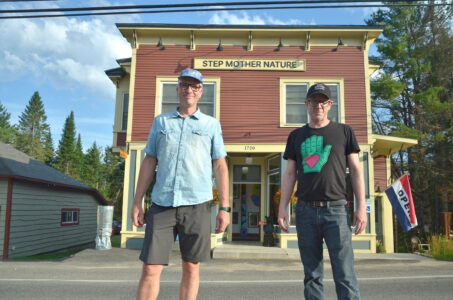DEC commissioner to step down
- State Department of Environmental Conservation Commissioner Basil Seggos speaks at a press conference announcing that work on the Adirondack Rail Trail is underway in November 2022. (Enterprise photo — Aaron Marbone)
- State Department of Environmental Conservation Commissioner Basil Seggos hands a diploma to Keene resident Allison Rooney, who was one of 38 forest rangers to graduate at a forest ranger graduation at the Lake Placid Conference Center in December 2022. (Enterprise file photo — Lauren Yates)
- DEC Commissioner Basil Seggos speaks at the grand opening of the first phase of Frontier Town, the so-called “Gateway to the Adirondacks,” in North Hudson in October 2018. (Enterprise file photo — Griffin Kelly)
- DEC Commissioner Basil Seggos speaks in Saranac Lake’s Riverside Park in September 2020. (Enterprise photo — Elizabeth Izzo)
- Then-Gov. Andrew Cuomo, right, and DEC Commissioner Basil Seggos, left, are seen here at a press conference announcing the state’s purchase of the Boreas Ponds land tract in May 2016 at Elk Lake. (Enterprise file photo — Justin A. Levine)
- John Tibbitts, left, then-commander of New York State Police Troop B, receives the DEC’s Col. William F. Fox Citizens Award from Commissioner Basil Seggos in April 2018. (Photo provided — New York state Department of Environmental Conservation)

State Department of Environmental Conservation Commissioner Basil Seggos speaks at a press conference announcing that work on the Adirondack Rail Trail is underway in November 2022. (Enterprise photo — Aaron Marbone)
State Department of Environmental Conservation Commissioner Basil Seggos plans to step down at the end of the 2024-25 budget process.
Seggos, 49, announced his departure from the DEC to staff in an internal email obtained by online news outlet POLITICO.
“After much deliberation, I have decided (to) step down as Commish. This has been an extremely tough decision because DEC is like a second home and I view you all like family,” he wrote. “But after more than eight years in this role, this is the right decision for me and my family. It’s time for a new chapter.”
Seggos has announced his departure from the DEC once before, in late 2018, before walking the statement back in February 2019. He was appointed DEC commissioner in October 2015 under then-Gov. Andrew Cuomo and is the longest-serving commissioner in the department’s 54-year history. It is unclear what Seggos plans to do next. Gov. Kathy Hochul has not yet made a statement about the Seggos’s departure.
Seggos said in his email to staff that “there will be more to report on the transition in the coming weeks.” It is unclear if a successor has already been chosen by Hochul. No successor has been announced.

State Department of Environmental Conservation Commissioner Basil Seggos hands a diploma to Keene resident Allison Rooney, who was one of 38 forest rangers to graduate at a forest ranger graduation at the Lake Placid Conference Center in December 2022. (Enterprise file photo — Lauren Yates)
Under Seggos’s leadership, the DEC enacted a ban on single-use plastic shopping bags, implemented a hiker registration pilot program at Adirondack Mountain Reserve’s property in St. Huberts and funded a shuttle service through the Essex County Transportation Department to transport hikers to trailheads along state Route 86 and reduce illegal roadside parking. Under his tenure, the DEC was also involved in a variety of state land purchases and easements. Earlier this month, Seggos announced that the DEC would purchase a 14,600 acre conservation easement near Tupper Lake to protect and study the Follensby Pond watershed.
He has also led the DEC as advocates pushed for increased forest ranger staffing as the state continues to protect more land. In 2019, at a legislative commitee meeting on environmental conservation, then-forest ranger union delegate Scott van Laer said the amount of land each ranger patrols had nearly doubled since the 1970s and the number of searches had also increased significantly. Seggos has said that since 2015, he has “worked hard to bolster ECO and forest ranger staffing levels.” In 2019, the DEC told the Enterprise that there were 134 forest rangers statewide; as of Sunday, the forest ranger force included that same number, according to the DEC website. Forest rangers and environmental conservation officers have for years been fighting for benefit and pay equity with other state law enforcement officers. Last year, legislation passed both houses of the state Legislature almost unanimously — the single vote against was by Sen. Jabari Brisport, D-Brooklyn — that would grant forest rangers and ECOs benefit equity. Hochul vetoed the bill in December, saying that the bills lacked a “funding source or plan to cover its costs.” She vetoed two similar bills the past.
Seggos’s tenure was also marked by a decade-long lawsuit brought against the DEC and the Adirondack Park Agency by North Creek-based environmental organization Protect the Adirondacks in which the DEC was found to have violated the New York state Constitution.
The lawsuit, alleging the DEC’s planned “Class II Community Connector” snowmobile trails violated the “Forever Wild” clause of the state Constitution, officially ended last September, with the DEC and APA ordered to pay Protect the Adirondacks $32,000. This reversed the Supreme Court’s initial 2017 decision that sided with the DEC and APA.
Peter Bauer, executive director of Protect the Adirondacks, said that the DEC and Adirondack Park Agency have “routinely cut corners and (subverted) the environmental laws they are supposed to uphold” in recent years.

DEC Commissioner Basil Seggos speaks at the grand opening of the first phase of Frontier Town, the so-called “Gateway to the Adirondacks,” in North Hudson in October 2018. (Enterprise file photo — Griffin Kelly)
“Under Seggos, the DEC has adopted a bunker mentality that excludes and evades public scrutiny and accountability and lacks transparency,” Bauer said. “We need fresh, new leadership at the DEC that will bring not only proven experience in managing a complex environmental regulatory agency, but also has a proven track record of upholding the rule of law and a commitment to reopening public engagement.”
Protect the Adirondacks called for Hochul to conduct a nationwide search for Seggos’s replacement on Friday.
“Recent appointees to the post have been selected as the result of a secretive political process in which political and personal loyalty were the main criteria,” the statement read. “Protect the Adirondacks calls upon Governor Hochul to break this chain of Albany-insider self-dealing and make New York’s environmental protection her top priority by conducting a nationwide search for a seasoned environmental professional.”
The Adirondack Council, an Elizabethtown-based environmental nonprofit organization, praised Seggos’s record.
“Commissioner Seggos did a really admirable job in challenging times,” said Justin Levine, communications associate at the Adirondack Council. “It’s been nice to have a steady hand, particularly with a change in New York state administration at the top.”

DEC Commissioner Basil Seggos speaks in Saranac Lake’s Riverside Park in September 2020. (Enterprise photo — Elizabeth Izzo)
Levine said some of Seggos’s “vitally important” accomplishments for the Adirondacks include the “30 by ’30” legislation signed into law in December 2022, which set a goal of conserving at least 30% of New York’s lands and waters by 2030, and the Climate Leadership and Community Protection Act, which was signed into law in 2019 and set a goal of the state operating on 100% clean energy by 2040.
Seggos plans to stay on through the state budgeting process, which Levine said is good for the Adirondacks.
“This is a tough budget year for New York state, but now is not the time to slow down or take our foot off the gas when it comes to protecting wildlands,” he said.
He added that Seggos’s replacement should be “somebody who’s willing to take the bull by the horns” as New York and the North Country continue to feel the effects of climate change.
State Sen. Dan Stec, R-Queensbury, said Thursday that Seggos “has a love of the environment, a love of the Adirondacks” and praised the commissioner’s tenure. Stec, whose father was a forest ranger, is the senior Republican lawmaker on the Environmental Conservation committee and will have a role in deciding on Seggos’s replacement. He said he would measure any candidates against Seggos’s record.

Then-Gov. Andrew Cuomo, right, and DEC Commissioner Basil Seggos, left, are seen here at a press conference announcing the state’s purchase of the Boreas Ponds land tract in May 2016 at Elk Lake. (Enterprise file photo — Justin A. Levine)

John Tibbitts, left, then-commander of New York State Police Troop B, receives the DEC’s Col. William F. Fox Citizens Award from Commissioner Basil Seggos in April 2018. (Photo provided — New York state Department of Environmental Conservation)










